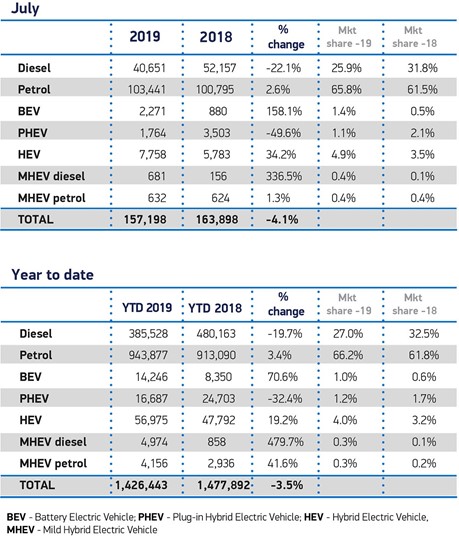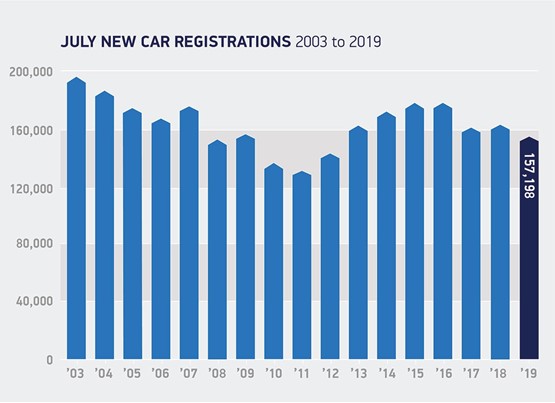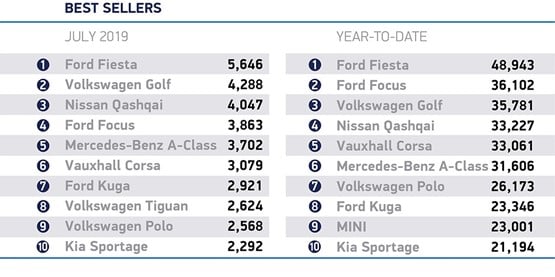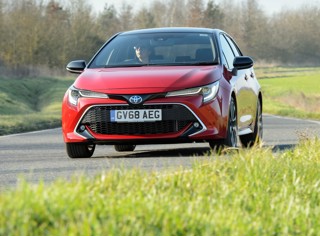There were 90,847 new cars registered to fleet and business in July, a 5.5% decline on the 96,161 units sold in July 2018.
Year-to-date, fleet and business new car registrations now stand at 792,004 – 4% down on the 823,169 units registered in the first seven months of 2018.
It follows a fall in June, when there were 133,310 new cars registered to fleet and business during, a 5% fall when compared to the 140,324 units registered during the same month last year.
Overall, figures from the Society of Motor Manufacturers and Traders (SMMT) show that 157,198 new cars were registered during July, a fall of 4.1%. It was the fifth consecutive month of decline, with the SMMT claiming that political and economic uncertainty, and confusion over future Government policy on different fuel types, continuing to knock consumer and business confidence.
Registrations of diesel vehicles fell for the 28th month, down 22.1%, while petrols remained stable, with 2,646 more registrations than in July 2018. Hybrid electric cars increased by a substantial 34.2%, with 7,758 of these low-emission vehicles joining UK roads.
Meanwhile, plug-in hybrid electric vehicles continued their recent decline, down 49.6%, but the demand for battery electric vehicles increased by 158.1%, resulting in a 1.4% market share, the highest monthly market share on record.
Mike Hawes, SMMT chief executive, said: “Despite yet another month of decline in the new car market, it’s encouraging to see substantial growth in zero emission vehicles.
“Thanks to manufacturers’ investment in these new technologies over many years, these cars are coming to market in greater numbers than ever before.
“If the UK is to meet its environmental ambitions, however, Government must create the right conditions to drive uptake, including long-term incentives and investment in infrastructure.
“The fastest way to address air quality concerns is through fleet renewal so buyers need to be given the confidence to invest in the new, cleaner vehicles that best suit their driving needs, regardless of how they are powered.”
Manufacturers have invested heavily in a growing range of powertrain options, with British drivers now having the choice of advanced low emission petrols and diesels, and an ever-greater number of hybrid, plug-in hybrid, battery electric and even hydrogen cars, says the SMMT.
There are currently more than 350 models available in the UK – around 80 of them alternatively fuelled, including 21 battery electric, with more expected to arrive in showrooms later this year.
SMMT forecasts this ongoing investment into new, ever more advanced powertrain technology will result in battery electric vehicles doubling their market share next year, with 51,000 registrations in 2020.
However, this will still represent only 2.2% of the overall market. For the UK is to meet its zero emission ambitions, we need world-class, long-term incentives, supportive policies and substantial investment in infrastructure.
Luxury saloons and specialist sports cars experienced a rise in registrations in the month with volumes driven by increased demand for dual purpose vehicles, up 12.8% to take nearly a quarter (24.4%) of the market. All other segments experienced declines in the month, with the biggest falls seen in executive (21.6%) and supermini (12.1%) segments.
Ian Gilmartin, industry director at Barclays Corporate Banking, said: “The industry is doing everything it can to try to stimulate demand – there are still good financing deals available and quality new models on offer. However, it’s all about the external environment at the moment, with no-deal Brexit fears growing and renewed currency weakness putting more pressure on supply chains and margins.
He continued: “Summer is always a bit quieter, so traders will be focused on their plans for the plate change in September, and hoping that the new administration in Westminster will take steps to give the industry the support it needs to get more cars rolling out of the showrooms before the end of the year.
“Whether it’s genuine clarity on policy around fuel types or more direct incentives to encourage drivers to upgrade their vehicle, the car sector needs to see something concrete that demonstrates explicit support from the government for the UK’s car traders and manufacturers.”
Michael Woodward, UK automotive lead at Deloitte, said: “Deloitte’s latest CFO survey revealed businesses are pausing investment, and the decline in business sales is part of this wider trend.
“For consumers, however, the growth of battery electric vehicles continues. Sales were up 158% month-on-month, with the sector expected to increase its market share significantly over the next few years. Recent announcements on company car tax included a clear incentive to support the adoption of zero emission cars from 2020.
“Car manufacturers are investing significantly in electric vehicle development and the new focus on introducing them to fleet and business sales will be welcomed.
“Alongside government incentives, the total cost of owning and running an electric vehicle continues to fall."
Deloitte analysis predicts a tipping point will be achieved in the UK by 2021, when electric vehicles are expected to become cheaper than their diesel and petrol counterparts.
Woodward continued: “For those consumers and businesses either unable or unwilling to make the leap to electric, we are seeing hybrid electric vehicles as a stepping stone, as sales jumped 34% compared to June.”
Jon Lawes, managing director of Hitachi Capital Vehicle Solutions, concluded: “Despite another challenging month for the UK car industry, a 70.6% year-to-date increase in battery electric registrations and its highest market share to date is encouraging for the future state of the market.
“Significant obstacles remain however. A 49.6% decline in plug-in hybrid models shows that the decision to exclude many of these vehicles from qualifying for subsidies is continuing to take its toll, and the lack of electric plug-in infrastructure is still hindering the transition to AFVs more widely.
“With a 62% majority in our recent research supporting the move to electric models, the appetite is there but the Government must work harder to incentivise greener vehicle purchases.”



























Login to comment
Comments
No comments have been made yet.